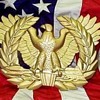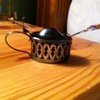Posted 12 years ago
 Chrisnp
Chrisnp
(310 items)
I’m posting this sword today as it relates to my last posting of a French Model 1915 Helmet. When haggling over the helmet at a second-hand store in Reno back in the early 1980s, the shop owner told me he got this sword from the same person, and he would include it if I paid $20 for both. Ah, the good old days.
Anyway, when I bought them, I had no idea what the sword was and I thought it might be an interesting research project. The langets made me think it was French from the start, but it took a number of years before I found a match online, right down to the exact same decorative engraving (last photo). According to the online source, this was a Napoleonic era cavalry officer’s sword.
My sword has a blade about 33” long, and engraved with floral work and stands of arms. In the case of the sword I found online, the blade was blued and the engraving was gold filled. Of course the grip on mine is gone, but the rest of the hilt is brass, with a lion’s head pommel. In addition to the corrosion, the blade edge nicked from use and the blade is warped – possibly from fire or maybe just being underground for a long time.














Out of curiosity, was the blade sharpened? I've had many western culture swords & never saw one with a sharpened blade. Been told that western culture considered sharpened blades barbaric. The western C. blades were for breaking bones & "running-through" in a "civilized" way. Have understood that the "barbaric" sharpened blades were mostly mid-east/oriental. The reasoning here being that a wounded person takes 7 people to care for where a dead one takes only 1 or 2 to bury. This reasoning carries on today, by the way. So comforting to know that we have "civilized warfare".
Hi Blunder,
This particular blade is too corroded and pitted to tell for sure, but my best guess is that its edge was similar to other Western swords you’ve seen – a definite cutting edge, but not sharp like a kitchen knife or even a Japanese katana.
Your question made me go back and read portions of “The Book of the Sword” by Richard Burton (no relation to the actor; the book was first published in 1884). He doesn’t really answer why European swords aren’t as sharp as those in some other cultures, but be does give some clues.
It’s clear that Europeans preferred the thrust over the cut, but when discussing curved cavalry swords, he says “The straight sword, used only for thrusting, is hard to handle when the horse moves swiftly; the broad straight blade loses its value by the length of the plane along which it must travel. On the other hand, the bent blade collects, like the battle axe, all the momentum at the ‘half weak’ or centre of percussion, where the curve is greatest. Lastly, the ‘drawing-cut’ would be easier to the mounted man, and would most injure the enemy.”
When he describes the sword edge, he begins by discussing an ordinary blade: “The two sides meet at an angle of eight degrees; consequently the edge lacks the thickness, weight and strength necessary for every cutting tool. For soft substances it should range from ten to twenty degrees, as in the common dinner knife. An angle of twenty-five to thirty five degrees, being the best for wood-working, is found in the carpenter’s plane and chisel. For cutting bone the obtuseness rises to forty degrees, and even to ninety; the latter being the fittest for sheering metals, and the former for sword blades, which must expect to meet with hard substances. But even an angle of forty degrees will be ineffectual upon a thick head, unless the cut be absolutely true.”
So, it sounds to me like the western curved sword was designed to have an axe-like edge, rather than a knife-like edge, because of the momentum collected at the point of impact and the expected contact with bone or other hard object.
It is an interesting point that doesn't seem to get addressed. Don't know where I read that tidbit about western culture blades, but in the hundreds I've seen, I don't remember even one being sharpened.
Thanks for the loves, like and comments Hems303, miKKoChristmas11, scottvez and mrmajestic1.